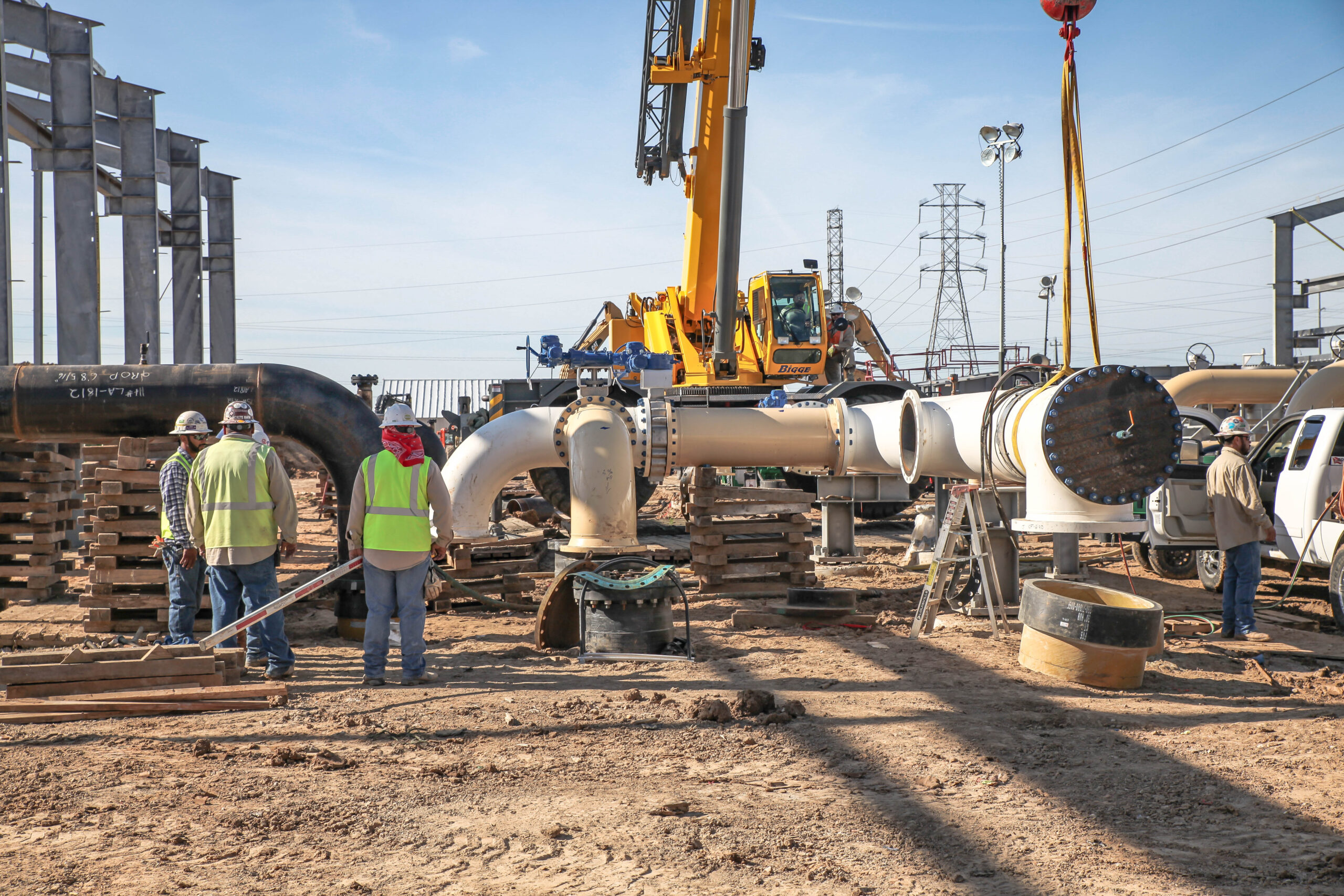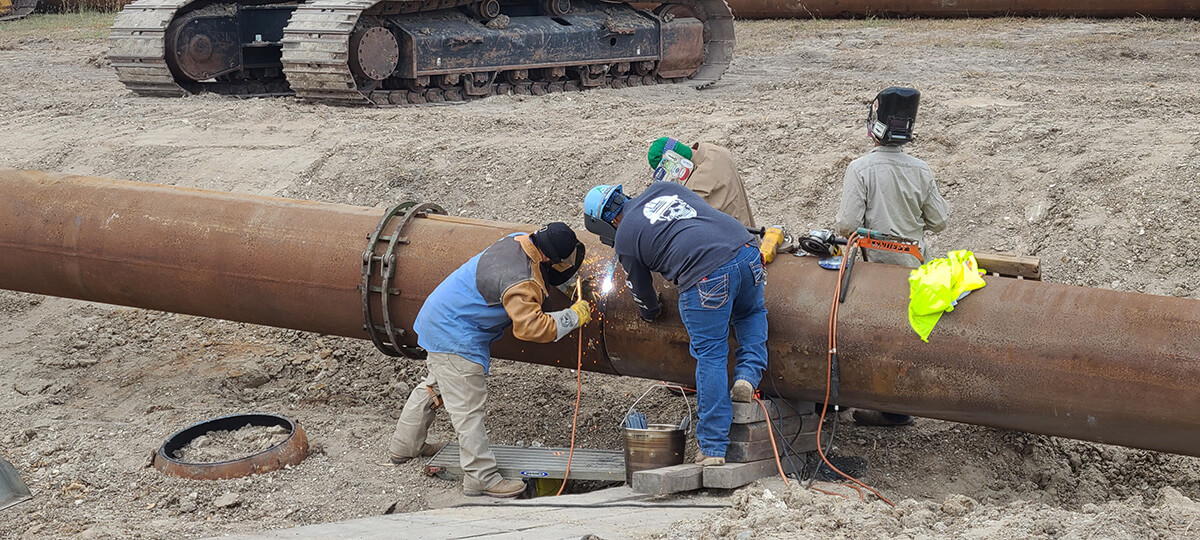The Crucial Guide to Understanding Pipeline Construction Providers and Their Value
Pipeline Construction solutions are fundamental to the transportation of necessary sources such as oil, gas, and water. These solutions involve careful preparation and implementation, sticking to rigorous safety and environmental criteria. As the sector adapts to modern difficulties, recognizing its components and ramifications becomes progressively crucial. What variables contribute to the expanding relevance of these solutions in today's economy? The complying with areas will explore these critical elements.
Introduction of Pipeline Construction Providers
Pipeline Construction solutions include an array of tasks essential for the installation and maintenance of pipes used to deliver numerous compounds, including gas, water, and oil. These solutions are essential for assuring the secure and efficient motion of resources from one location to one more. The procedure normally begins with detailed preparation and style, which considers governing demands, environmental considerations, and logistical challenges.
As soon as preparation is total, excavation and grading of the land are conducted to prepare the site for Pipeline installation. This is followed by the real laying of the pipelines, which includes welding or joining sections with each other to create a continual circulation path. After installation, extensive testing is executed to ensure honesty and safety and security. Maintenance solutions are likewise given to deal with any concerns that may arise gradually. In general, Pipeline Construction solutions play an essential role in sustaining framework for power and water circulation.
Secret Elements of Pipeline Construction
A successful Pipeline Construction task counts on several essential parts that assure the efficient and secure installment of the Pipeline system. Complete site evaluations are vital, as they recognize the geographical and environmental variables that may affect Construction. Next, the choice of proper materials, such as pipes and fittings, is crucial for securing toughness and compatibility with the transferred compounds.
In addition, progressed Construction techniques, including trenchless technology and directional drilling, improve effectiveness and lessen ecological impact. Reliable project administration is another vital component, collaborating labor, equipment, and timelines to meet task objectives.
Furthermore, communication among stakeholders, consisting of engineers, service providers, and regional authorities, guarantees alignment on project requirements and demands. Complete high quality control measures throughout the Construction procedure ensure compliance with sector requirements and make the most of the Pipeline's functional lifespan. Jointly, these elements create the backbone of an effective Pipeline Construction job.
Safety Requirements and Regulations in Pipeline Construction

Regulative bodies, such as the Occupational Safety and Health Management (OSHA) and the Pipeline and Hazardous Products Security Management (PHMSA), stated particular requirements that govern Construction techniques. These consist of procedures for equipment usage, worker training, and emergency response treatments. By carrying out these requirements, Construction business not only safeguard their staff members yet likewise secure public count on. Ultimately, extensive safety measures add to the lasting success of Pipeline jobs, ensuring they satisfy both operational and environmental assumptions.
Environmental Considerations in Pipeline Projects

Ecological factors to consider are important to the preparation and execution of Pipeline tasks. These projects need to analyze potential influence on environments, water sources, and local wildlife. Carrying out comprehensive ecological influence assessments (EIAs) is important, permitting stakeholders to recognize and minimize risks prior to Construction starts.
Shielding delicate locations, such as wetlands and habitats, typically needs implementing particular style functions or alternate directing to lessen disturbance. In addition, Pipeline drivers are entrusted with creating methods for avoiding leaks and spills, which can have destructive impacts on the atmosphere.
Interaction with regional neighborhoods is vital, as public worries can result in job adjustments that boost ecological security. Compliance with guidelines established by ecological firms ensures that jobs satisfy sustainability requirements, fostering an equilibrium in between facilities demands and eco-friendly conservation. Eventually, attending to ecological considerations not just safeguards nature yet likewise promotes area depend on and project viability.
The Duty of Innovation in Pipeline Construction
Innovation plays a necessary function in modern-day Pipeline Construction, improving efficiency and precision. Advanced surveying techniques enable precise planning and implementation, reducing ecological impact and task delays. In addition, the assimilation of automation and robotics improves procedures, reducing labor expenses and boosting security on Construction sites.
Advanced Checking Strategies
Advanced surveying methods play a necessary role in the effective implementation of Pipeline Construction projects. These techniques leverage cutting-edge innovation to assure accurate mapping and evaluation of the surface where pipelines will be mounted. Techniques such as Geographic Info Solution (GIS), LiDAR (Light Discovery and Ranging), and 3D modeling allow designers to picture and analyze the landscape, identifying environmental worries and possible barriers. By making use of these advanced tools, teams can enhance accuracy ready and positioning, greatly lowering the risk of errors during Construction. Additionally, real-time information collection permits immediate adjustments and informed decision-making throughout the project lifecycle. Ultimately, these evaluating developments contribute to improved efficiency, safety, and sustainability in Pipeline Construction efforts.
Automation and Robotics

Economic Impact of Pipeline Facilities
Pipeline framework plays a necessary function in shaping regional economic climates and facilitating profession. By offering a reputable methods of delivering oil, gas, and other commodities, pipes reduce transport costs and improve supply chain performance. This infrastructure brings in investment, promotes work creation, and promotes financial growth in bordering locations.
The Construction and upkeep of pipes add considerably to regional economic situations, creating various employment possibilities in various markets, from design to labor. The increase of work typically results in boosted spending in local companies, even more boosting economic activity.
Additionally, pipelines enhance power safety and security by making certain a secure supply of sources, which is critical for industrial procedures and domestic requirements. As areas come to be adjoined through Pipeline networks, they gain access to more comprehensive markets, raising competition and financial strength. The economic impact of Pipeline framework is multifaceted, affecting both immediate local economies and more comprehensive regional development.
Future Trends in Pipeline Construction Providers
The future of Pipeline Construction services is evolving in response to technological advancements, governing modifications, and growing ecological considerations. Innovations such as robotics and drones are enhancing inspection and upkeep processes, improving safety and performance. Automation is poised to lower labor expenses and raise precision in Construction operations. In addition, the enhancing emphasis on sustainability is triggering companies to take on eco-friendly products and practices, lining up with global initiatives to lower carbon footprints.
Regulative structures are also adjusting to attend to ecological impacts, promoting better openness and liability in Pipeline projects. In addition, the integration of wise innovations, consisting of real-time monitoring systems, next page is anticipated to boost the integrity and performance of Pipeline networks. As power demands change toward renewable resources, Pipeline Construction services will likely see a rise in jobs connected to biofuels and hydrogen transport. In general, these trends suggest a transformative duration for the Pipeline Construction sector, concentrated on innovation and sustainability.
Frequently Asked Questions
What Kinds of Pipelines Are Commonly Constructed?
Various kinds of pipes are generally constructed, consisting of oil, sewage, water, and gas pipelines - Pipeline Construction Services. Each serves distinct objectives, promoting the transport of vital resources across areas while adhering to security and ecological guidelines
How much time Does a Common Pipeline Project Take?
The period of a typical Pipeline task differs considerably, commonly ranging from numerous months to a few years. Factors affecting this timeline include project intricacy, regulative approvals, and environmental factors to consider that have to be attended to.
Who Manages Pipeline Construction Business?
Pipeline Construction companies are regulated by numerous federal, state, and neighborhood companies, including the Pipeline and Hazardous Materials Security Administration (PHMSA) and state utility commissions, ensuring compliance with safety and security and environmental criteria throughout the Construction process.
What Are Typical Materials Used in Pipeline Construction?
Common materials utilized in Pipeline Construction consist of steel, pvc, and polyethylene. Each product uses distinct benefits such as resistance, sturdiness, and flexibility to rust, making them Get More Information ideal for various applications in transferring gases and fluids.

Exactly How Are Pipeline Construction Prices Estimated?
Pipeline Construction costs are approximated by evaluating variables such as material costs, labor prices, job complexity, ecological factors to consider, and regulatory demands (Pipeline Construction Services). Exact cost estimation guarantees efficient budgeting and task preparation throughout the Construction process
Pipeline Construction services incorporate a range of activities essential for the installation and maintenance of pipes made use of to move various compounds, including water, gas, and oil. A successful Pipeline Construction project depends on numerous key components that guarantee the efficient and risk-free installation of the Pipeline system. Advanced evaluating techniques play an important duty in the successful implementation of Pipeline Construction tasks. Numerous kinds of pipes are generally constructed, including oil, gas, sewage, and water pipes. Pipeline Construction prices are approximated by assessing variables such as product costs, labor rates, task intricacy, ecological factors to consider, and regulative demands.